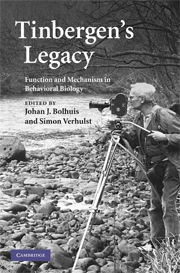Book contents
- Frontmatter
- Contents
- Contributors
- Foreword by Aubrey Manning
- Preface
- 1 On aims and methods of ethology
- 2 Tinbergen's four questions and contemporary behavioral biology
- 3 Causation: the study of behavioral mechanisms
- 4 Tinbergen's fourth question, ontogeny: sexual and individual differentiation
- 5 The development of behavior: trends since Tinbergen (1963)
- 6 The study of function in behavioral ecology
- 7 The evolution of behavior, and integrating it towards a complete and correct understanding of behavioral biology
- 8 Do ideas about function help in the study of causation?
- 9 Function and mechanism in neuroecology: looking for clues
- References
- Index
6 - The study of function in behavioral ecology
Published online by Cambridge University Press: 19 February 2010
- Frontmatter
- Contents
- Contributors
- Foreword by Aubrey Manning
- Preface
- 1 On aims and methods of ethology
- 2 Tinbergen's four questions and contemporary behavioral biology
- 3 Causation: the study of behavioral mechanisms
- 4 Tinbergen's fourth question, ontogeny: sexual and individual differentiation
- 5 The development of behavior: trends since Tinbergen (1963)
- 6 The study of function in behavioral ecology
- 7 The evolution of behavior, and integrating it towards a complete and correct understanding of behavioral biology
- 8 Do ideas about function help in the study of causation?
- 9 Function and mechanism in neuroecology: looking for clues
- References
- Index
Summary
Behavioral ecology is primarily concerned with the determination of the function, or survival value, of behavior (Krebs and Davies, 1993, p. 1). However, as should be evident from the fact that philosophers of science have devoted many volumes to debating the question of function, it is not straightforward even to define what “function” is, far less defend the validity of the various approaches used to investigate it. As it is relatively rare for behavioral ecologists, in common with most working biologists, to consider such seemingly rarefied debates, I start this chapter by examining the question of function. I place special emphasis on the development of Tinbergen's interest in the topic, but also try to draw conclusions in the light of recent treatments of the subject by philosophers and philosophically minded behavioral ecologists. I will then explore the reasons for behavioral ecologists' special interest in functional questions, and the merits of the different approaches to determining the function of behavior. Although the aims and methods of behavioral ecology are often portrayed as following the Tinbergian tradition within ethology, there are important differences. Finally, I will discuss where this has got us and, dangerous though it may be, I will attempt to forecast the future of the subject.
TINBERGEN AND FUNCTION
When Niko Tinbergen was a student at Leiden University in the late 1920s, his notion of “function” in relation to animal behavior was probably that of any layperson with an interest in natural history: the role that behavior plays in the animal's life.
Information
- Type
- Chapter
- Information
- Tinbergen's LegacyFunction and Mechanism in Behavioral Biology, pp. 107 - 126Publisher: Cambridge University PressPrint publication year: 2009
Accessibility standard: Unknown
Why this information is here
This section outlines the accessibility features of this content - including support for screen readers, full keyboard navigation and high-contrast display options. This may not be relevant for you.Accessibility Information
- 5
- Cited by
